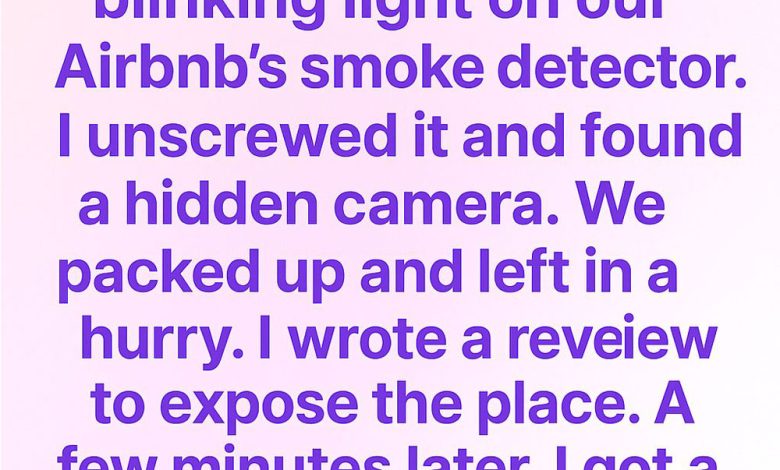My Wife Noticed A Blinking Light On Our Airbnb’s Smoke Detector—Then A Message Changed Everything

The moment my wife, Namira, pointed to the ceiling of our rented home, a familiar feeling of unease washed over me. We were staying at an Airbnb for a short trip, and she had noticed a tiny, insistent blinking light on the smoke detector right above us. It seemed out of place.
That small, pulsing light quickly led to a discovery that put an immediate end to our vacation plans. I got a chair, carefully unscrewed the smoke detector from the ceiling, and found something deeply concerning hidden inside the casing: a hidden camera.
We felt violated and angry. Without a second thought, we packed our bags, rushed out, and drove away from the house. Our first action was to post a review on the Airbnb site to expose the host and the property. We felt it was our duty to warn any future guests about what we had found.
The Host’s Unexpected Reply
A few minutes after I published the angry review, my phone chimed with a reply from the host. It was a strange, short message that immediately changed everything.
The message started simply: “You fool, this is…”
I paused, thinking this was some kind of defensive, weird joke. But the host continued the message, revealing a heartbreaking situation: “…my mother’s house.”
This immediately threw me off. What did his mother’s house have to do with illegally filming his guests?
The host’s explanation continued in the next few sentences. “She passed away two months ago. That camera was for her safety. It automatically sends alerts to my phone.”
Namira leaned over my shoulder to read the exchange. She was completely confused and skeptical. “What is he even saying? That he watches guests live on camera?” she asked.
I mumbled my own interpretation, feeling the situation shift from a security breach to something far more complex. “Apparently not guests,” I muttered. “His mother.”
An Honest Oversight
The host, whose name was Marten, sent a quick follow-up message trying to explain the situation clearly. He admitted he had simply forgotten to remove the camera. He hadn’t even realized that the house had been reactivated for new guests. He claimed his sister had quickly reopened the listing without properly double-checking the setup or telling him.
By the time this second message arrived, we were already halfway to a motel. We had no intention of going back.
“I still don’t like it,” Namira said, arms folded in the passenger seat. “Even if it was for an old lady, he should’ve told us. That’s violating.”
I agreed with her entirely. Finding a hidden camera is a huge invasion of privacy, regardless of the reason it was put there. But I also found myself unable to shake the tone of Marten’s messages. They didn’t sound defensive or angry; they sounded genuinely like someone caught in a terrible, awkward oversight.
Still, the thought of turning around and sleeping under that ceiling light—even if we knew the full story—was too much. We checked into a basic motel for the night. It wasn’t fancy, but it felt safe.
The True Story Behind the Camera
The next morning brought another message from Marten. This one was far more personal and painful, and it completely changed my perspective.
“I’m so sorry,” he wrote. “My mom’s name was Mila. She had dementia. The camera helped us make sure she didn’t leave the stove on or get confused at night. I didn’t mean to spy. I didn’t even realize someone had booked the place. My sister handles the account now and she didn’t tell me.”
To help us understand his loss, he also attached a photo of his mother. It was a sweet picture of an elderly woman with kind eyes and silver braids, sitting in the very same kitchen where we had made coffee just the day before.
The final line of that message was heartbreaking: “I miss her so much,” the message said. “The house still smells like her lotion.”
At that point, I felt a wave of guilt. I had written a very scathing review, accusing him of privacy invasion. That review already had dozens of likes and comments from people piling on with anger and outrage. But how could I have known the true story behind the camera?
Namira was also conflicted. “What if he’s just trying to guilt us into deleting the review?” she wondered aloud.
“Maybe. But what if he’s not?” I replied.
We decided to pause our decision-making and reach out to Airbnb support for an impartial view. We needed to confirm Marten’s story. The support team confirmed that the host had indeed paused the listing for two months following a death in the family. It had only recently been reactivated by a different contact person—Marten’s sister—without his full knowledge.
The Crucial Detail
Then came the most important piece of information. Airbnb support mentioned a key detail: the camera in the smoke detector wasn’t a standard recording device. It was a specialized, motion-triggered alert cam connected to an emergency contact. It did not store footage; it only sent an alert to a phone when movement was detected, which was clearly set up for his mother’s safety.
Namira groaned and dropped her phone. “Well, now we really look dramatic.”
I stared at the ceiling of the motel room. The situation had shifted entirely. We had acted quickly based on suspicion, and now we had the facts. “So… do we take the review down?”
There was a long silence. It’s hard to admit when you’ve overreacted, but our actions now seemed excessive. While the principle of privacy was still valid, the context was one of grief, not malicious intent. The original, angry review remained online. One part of my mind still argued that we had done the right thing, but another part worried about the consequences of the review.
The Cost of the Review
Two days later, we received a new message, this time from Marten’s sister, Ritha. It was short and painful to read.
“I hope you feel good about driving away the only memories he had left,” it read.
That message stung deeply. I tried to tell myself I didn’t owe her anything, but the idea that our review was causing more than just a loss of bookings—that it was adding to someone’s pain—kept nagging at me.
After three days of thinking, I reached out to Marten directly to apologize.
“I’m sorry,” I wrote. “I jumped to conclusions. I didn’t realize the full situation.”
His reply came back within minutes.
“I don’t blame you,” he said. “Honestly, I probably would’ve done the same. I just… I haven’t been back to that house since she passed. My sister put it back on Airbnb because we’re trying to figure out what to do with it. I didn’t even know someone had booked it until the camera sent me an alert.”
Then he added a line that truly hit home: “I haven’t unscrewed that smoke detector since the night she died.”
He explained his reason for leaving it there: “I kept it there,” he went on, “because it was the last thing that made me feel like she was still around. I’d check it every few days, even though no one was there. Like a dumb ritual.”
He didn’t make excuses or ask us to delete the review; he simply told the honest, difficult truth about his grief.
Changing the Narrative
His honesty convinced me to call Airbnb again. I asked if I could edit the post instead of removing it completely. They agreed.
I rewrote the entire review. I explained the misunderstanding, confirmed the facts about the camera, and asked readers not to judge the host too harshly. I added a note about grief—how it can make people do very odd, sentimental things. I suggested we should be curious, not just furious.
The response from the online community was supportive. People began sharing their own stories of loss and the strange ways they cope. One person talked about finding an old voicemail from their late husband that they couldn’t bring themselves to delete. Another said he still paid for his dad’s Netflix account just to see the “Are you still watching?” popup.
It became clear that grief makes us all act strangely, but it also shows our shared humanity.
A New Beginning
A week later, Marten messaged me again with a simple, kind invitation: “If you’re ever back in town,” he said, “coffee’s on me.”
We weren’t planning to return, but something inside me told me we needed to meet him. Namira was hesitant, joking, “You’re not dragging me into a murder documentary, right?” but she agreed.
We met Marten at a coffee shop near the lake. He looked tired but was very kind, with the same eyes as his mother in the photo. He spent an hour telling us stories about Mila: how she used to knit scarves even in the middle of summer and how she kept her cookie tins labeled, even though they all held sewing supplies. He cried quietly once, then quickly changed the subject.
Near the end of our conversation, he looked straight at me.
“That review you wrote. At first, I hated it. But now… I kind of think it saved me,” he admitted.
I didn’t understand what he meant.
He explained that my panicked post had forced him to act. “It made me go back. I hadn’t stepped foot in that house since the funeral. But when I saw your post, I panicked. I drove over at 2 a.m. to check the camera. And when I got there… I sat on the couch for three hours. I just sat there. And for the first time, it didn’t feel unbearable.”
Sometimes, moments of pain or conflict can crack open a situation in a way that allows something good to finally enter.
A few months later, Marten messaged one last time: “I’m selling the house. But before I do, I’m hosting one last gathering. Want to come?”
We couldn’t attend, but we sent flowers. He replied with a photo of his mother’s kitchen table, now covered with candles and small, handwritten memories from neighbors, friends, and even previous guests—a final, beautiful tribute to Mila.
I printed that photo and put it on our fridge.
It serves as a constant reminder of how easy it is to assume the worst in people and how quickly we are to judge without asking questions. But it also reminds us of the power of grace. If I hadn’t written that first angry review, Marten might never have had the push he needed to finally go back to that house and begin to heal.
Now, whenever we check into a new Airbnb, I still check the smoke detectors. But I check with more than just suspicion. I check with a reminder that sometimes, the things we fear are just fragments of someone else’s love, left behind.
This story moves us all to reflect on how we react to the unexpected. If it reminded you to pause and listen before judging, feel free to give it a like or share it with others.




